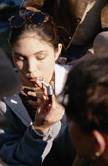
THURSDAY, Sept. 6 (HealthDay News) — Peer pressure continues to prompt high school students to light up, new research suggests, because popular teens tend to smoke and they induce others to take up the habit in an effort to fit in and be liked.
“Popularity is a strong predictor of smoking,” said study author Thomas Valente, a professor of preventive medicine at the University of Southern California’s Keck School of Medicine. “We haven’t done enough to make it cool not to smoke.”
The finding, published online Sept. 6 in the Journal of Adolescent Health, confirms trends Valente found in previous research studying smoking in students in sixth through 12th grade across the United States and in Mexico.
The new research found that the most popular kids in seven predominantly Hispanic/Latino high schools in southern California were more likely to smoke cigarettes than were other students. It turns out that just thinking your friends are smokers — even if they aren’t — makes you more likely to smoke. And the more popular you are, the earlier you’re likely to start.
“It’s the popularity that’s a risk factor for smoking, and it’s very disturbing,” said Dr. Norman Edelman, chief medical officer for the American Lung Association and a professor of preventive medicine at Stony Brook University, in New York.
According to the American Lung Association, 68 percent of adult smokers started at age 18 or younger, and every day almost 3,900 children under 18 try their first cigarette. People who start smoking in adolescence are more likely to develop a severe addiction to nicotine than are those who start later.
The researchers asked 1,950 students in the ninth and 10th grades in 2006 and 2007 whether they had ever tried smoking, how often they smoked in the past month, how many students they thought smoked cigarettes and how they thought their close friends felt about smoking. They also asked the teens to identify their five best friends at school, a question designed to reveal the students’ social networks.
Popularity was measured by how often the students named someone as a friend.
Those who thought their close friends smoked were more likely to be smokers, too, and those who smoked tended to form friendships with others who smoked as well.
Kids tend to be more interested in what their immediate friends are doing than in what most students are doing in their school, the study found. The researchers also discovered that students cared more about whether their particular group of friends smoked than whether they believed most people in their high school lit up.
Valente said the research shows that parents should be wary of encouraging their kids to try to fit in. “We always want our kids to be popular, but there’s a liability to that. By being popular you’re more aware of other things that are happening around you and you want to be sure to retain that popularity, which in and of itself is stressful.”
Popularity is probably a risk factor for other behaviors that can spread through schools, including binge drinking, risky sexual activities and some unhealthy eating behaviors, Valente added.
How can adults counteract the impact of popularity on kids when it comes to smoking? Valente said kids need to be told that the tobacco industry is manipulating them to smoke, “since teenagers don’t like to be manipulated.” He also said research shows it is effective to recruit popular kids to discuss why smoking is not “cool.”
Edelman said the solution may be pocketbook-based. “Kids are prone to risky behavior because they feel immortal. The most tried-and-true method, especially with adolescents, is to raise the price of cigarettes.”
More information
Visit the American Lung Association to learn more about teen smoking.

